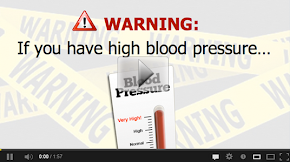High blood pressure symptoms - 5 Symptoms to watch
Hypertension, or high blood pressure as it is
more commonly called, is known for the doctors and nurses as the silent
killer. This is because it affects nearly a quarter of all adults in the
United States, and not all of them are aware. High blood pressure symptoms
are, for the most part non-existent. There are some warning signs that appear
in some people, but they usually appear only later, when the damage has been
done to the heart and blood vessels so it is important to identify early high
blood pressure symptoms.
Unless you monitor your blood pressure regularly, you
can never be sure if it is healthy levels. Some of the words, but not limited
to,
the high blood pressure symptoms are:
• Dizziness
• Dizziness
• Nausea and vomiting
• The Chest pain
• Difficulty breathing
• Blurred vision
People often misinterpret these symptoms as signs of
something else, something less serious than hypertension. At times, they
are correct. What could be confused with vertigo due to hypertension
could very well be just because of the exhaustion of the work of a painful day.
On the other hand, you might be rejecting, when in fact it is a sign that your blood
vessels are taking some pressure too.
Unfortunately, many people learn they have high blood
pressure only when symptoms of organ damage begin to appear. More
often than not, the damage has been going on for a long time and, by then
irreversible.
Some of the most devastating high blood pressure symptoms are:
1. the heart attack.
This happens when part of the heart is cut off blood
circulation, therefore refuse to give oxygen to the whole heart needs to
survive. When the heart lack of oxygen, its cells languish and die.
2. heart failure.
When the heart is weakened, it is unable to pump enough
blood drive is transmitted to the lungs or other parts of the body. Heart
failure does not mean a complete shutdown of the heart, but it is one of the
leading causes of death in the United States.
3. the stroke.
When blood vessels are damaged, it becomes difficult for
fresh, oxygenated to travel to the brain blood. When the brain works breaks the
blood, brain cells die per minute, causing a stroke.
4. Renal failure.
High blood pressure damages the blood vessels,
including those in the kidney, two of the most important glands in the body.
Damaged kidneys do not function to filter waste and toxins from the blood,
increasing blood pressure more. It is a devastating cycle that goes on
and on.
5. A gradual loss of vision.
The blood vessels behind the eyes are also affected. When
this happens, it can lead to a condition known as hypertensive
retinopathy name, where the veins on the back of the eye are damaged and can
not lead to progressive blindness.














.jpg)




0 comments:
Post a Comment